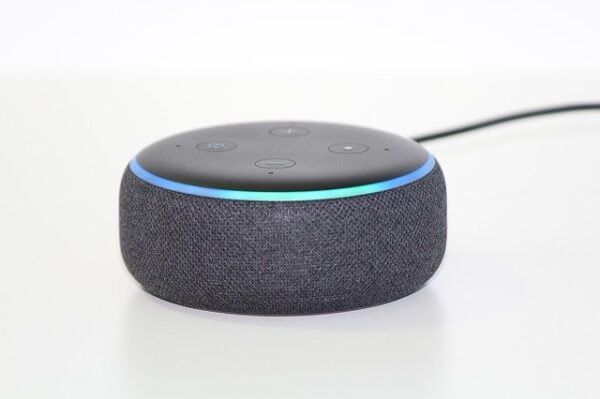I discuss smart speakers and how easy it is to spend money unintentionally (and potentially recklessly) with them.
Leading the list on the worst blog ideas for me to write would be one with reviews of the latest tech gadgets.
My current phone is pretty new, but it’s a flip phone so no one cares about it. My music player is over a decade old (ahem, I have a dedicated music player), my car is approaching two decades, and even my laptop is getting on in years.
So no one would accuse me of being a trend chaser, unless someday flip phones become a trend again (wait for it).
Because of this, I tend to miss things as they become ubiquitous.
And one of those things are smart speakers, those little devices that sit in your home and respond to voice commands.
As of 2021, 94 million people in the U.S. owned some form of smart speaker. That’s more than one in three adults.
But just because lots of people are doing something doesn’t mean that it’s a good idea.
And smart speakers, as far as your financial wellness is concerned, is anything but a good idea.

Table of Contents
Some things smart speakers do
A smart speaker, to quote the Wikipedia entry:
“…is a type of loudspeaker and voice command device with an integrated virtual assistant that offers interactive actions and hands-free activation”
So it’s a device that responds to your voice instead of a mouse click, keyboard, button, or touch screen.

What can these devices do? Well, pretty much anything. They typically integrate with media systems, as well as integrate with other interfaces, such as phones or Bluetooth devices.
Dumb but mostly harmless
Connecting to home devices with an audio hook seems a little pointless to me, unless you have a disability and can’t utilize a remote or a screen.
Do you really need a device that will turn on your “smart lights” to the desired dimness? Is a switch too complex? Do you really need to say, “SET A TIMER FOR 20 MINUTES!” like a tech lord and have machines do your bidding? Do you need it to listen to your appliances beeping? Of course not.
But it’s also harmless. If you get off on the coolness of the tech, then there’s nothing necessarily wrong with it.
Except for the fact that you’re buying more unnecessary stuff, all of which is expensive and going into landfills as soon as the next mandatory update. But it’ll go nice with the smartphone you buy every two years.
“Alexa, drain my bank account”
Smart speakers also, naturally, connect to the Internet, and here’s where the problems begin.
Because most people, when they think of smart speakers, they think of only a few words.
Alexa.
Siri.
Cortana.
You see, these devices aren’t some expensive way to turn lights on or play the Hamilton soundtrack.
These devices are essentially frictionless spending devices, all-but-forcing you to make unintentional purchases.
You connect your smart speaker to Amazon, and then you can just issue a single command and Alexa will order you a pack of 9V batteries, a new shirt, or an electric lawnmower, whatever comes to mind.
There is absolutely nothing good about this.
You think I’ve railed against the problems with Amazon Prime? Well, that’s peanuts compared to this.
Because this is Prime on steroids. This is zero-click ordering.
When you can just speak a thought and have it get ordered, you are on track to making some bad financial decisions.
The importance of friction
Friction is important in purchases. They slow you down. They make you think. That’s good.
When I find something that I want that above a certain price, I always wait 24-48 hours before purchasing it. If I’m still thinking about it, then it’s worth it, but if I forget about it, then it probably wasn’t worth it anyway.
And companies love to make purchasing as frictionless as possible. Which makes sense for them, because they make more money from you.
When purchases are easy, you are more likely to make ones that you don’t truly want or need. It may have just seemed like a good idea at the time, but that time passes.
A note about privacy
I can’t mention smart speakers without mentioning privacy. Smart speakers are listening to you and recording your voice. Whatever you say, the arguments you have, the phone conversations, the TV shows, the sex you have, all of it is being recorded.
Do you feel okay with that? Do you truly consent, or do you just not want to think about it?
I already dislike smart speakers because of the impact they have on people’s finances, but considering all the lengths I go in order to reduce how I’m tracked online, this part really irks me.
I do not consent to be recorded, which makes it increasingly uncomfortable for me when I go places. I’m not yet at the point where I’m going to be the annoying one that asks for the host’s smart speakers to be disabled when I visit places. But that may change.
Once upon a time, people who didn’t eat meat were considered outliers, and their desire for non-meat options weren’t easily met. Now, I wouldn’t say that it’s mainstream, but being vegetarian is certainly not an outlier status anymore.
Will people’s aversion to smart speakers go the same way? I hope so. Alexa, make a note of it.

